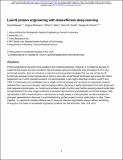Low-N protein engineering with data-efficient deep learning
Author(s)
Biswas, Surojit; Khimulya, Grigory; Alley, Ethan C; Esvelt, Kevin M; Church, George M
DownloadSubmitted version (2.010Mb)
Open Access Policy
Open Access Policy
Creative Commons Attribution-Noncommercial-Share Alike
Terms of use
Metadata
Show full item recordAbstract
Protein engineering has enormous academic and industrial potential. However, it is limited by the lack of experimental assays that are consistent with the design goal and sufficiently high throughput to find rare, enhanced variants. Here we introduce a machine learning-guided paradigm that can use as few as 24 functionally assayed mutant sequences to build an accurate virtual fitness landscape and screen ten million sequences via in silico directed evolution. As demonstrated in two dissimilar proteins, GFP from Aequorea victoria (avGFP) and E. coli strain TEM-1 β-lactamase, top candidates from a single round are diverse and as active as engineered mutants obtained from previous high-throughput efforts. By distilling information from natural protein sequence landscapes, our model learns a latent representation of 'unnaturalness', which helps to guide search away from nonfunctional sequence neighborhoods. Subsequent low-N supervision then identifies improvements to the activity of interest. In sum, our approach enables efficient use of resource-intensive high-fidelity assays without sacrificing throughput, and helps to accelerate engineered proteins into the fermenter, field and clinic.
Date issued
2021Department
Massachusetts Institute of Technology. Media LaboratoryJournal
Nature Methods
Publisher
Springer Science and Business Media LLC